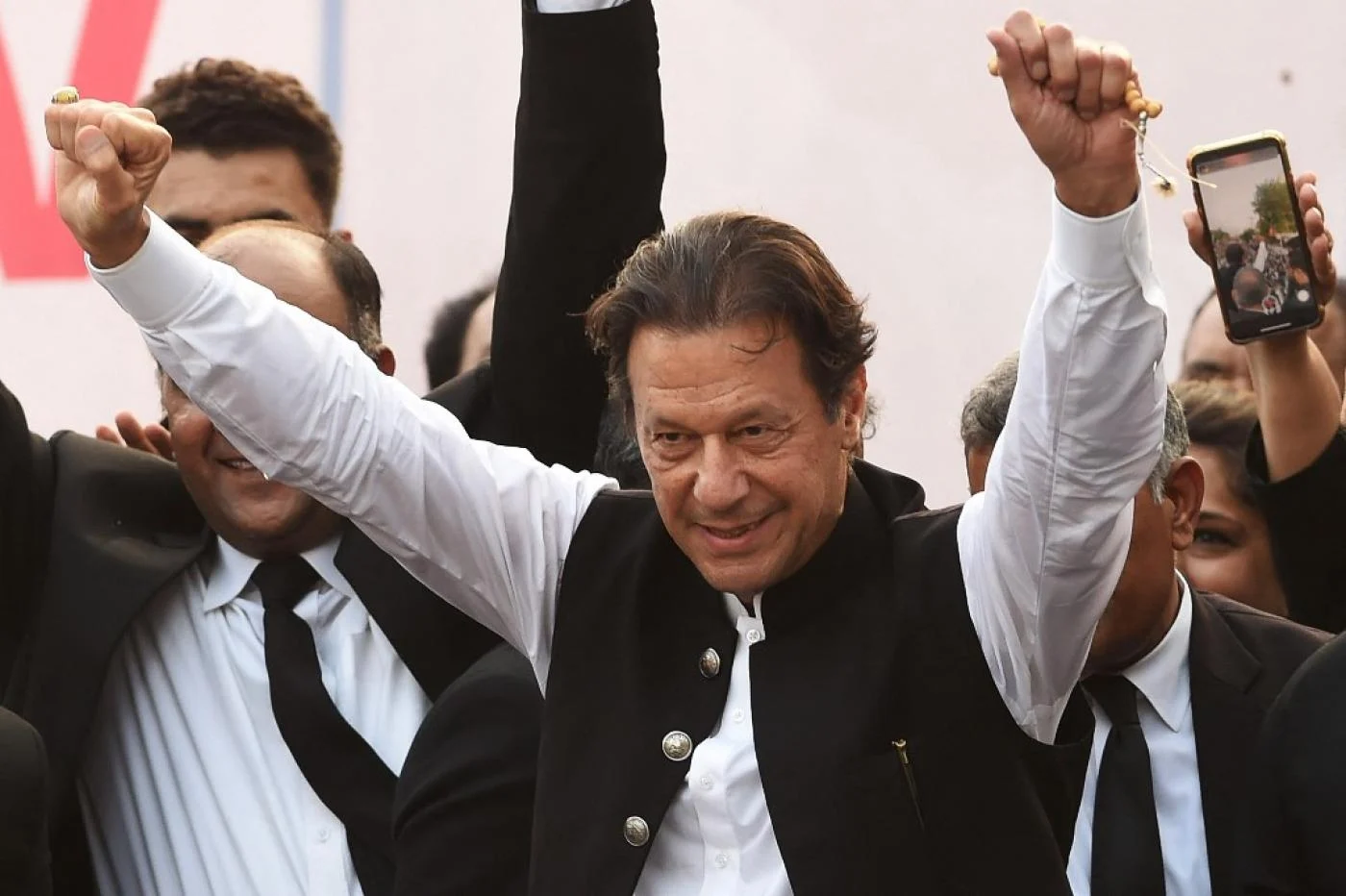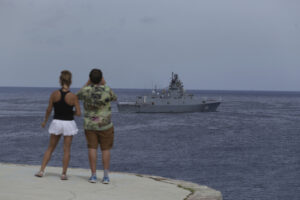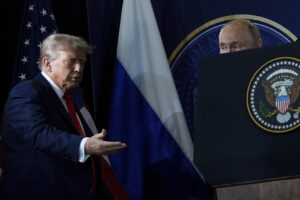Making of a Martyr
Imran Khan’s constitutional coup and subsequent dissolution of the National Assembly has polarized Pakistan; a flurry of allegations has magnified the power of the military in the country’s domestic politics.

Image Credit: AFP
Imran Khan’s constitutional coup and subsequent dissolution of the National Assembly has polarized Pakistan; a flurry of allegations has magnified the power of the military in the country’s domestic politics. Pakistan’s current constitutional crisis was sparked by a vote of no-confidence against Imran Khan in April 2022 but has escalated further now that Khan has been disqualified from the next set of elections in August 2023. In the wake of the vote of no confidence, Khan rallied unprecedented support against the military establishment while he simultaneously claimed an American conspiracy removed him from office, which may have been fabricated. The cipher conspiracy implicates the United States in the vote of no-confidence due to Imran Khan’s visit to Putin on the day of the Russian Invasion of Ukraine and lack of cooperation with Western sanctions.
After he was barred from elections on October 21, 2022, Khan began his “complete freedom” protest march in Lahore. While the PTI has momentum, Khan aims to move up elections from the scheduled date in August. His party, the Pakistan Tehreek-e-Insaf (PTI), made it six days into the march before there was an assassination attempt. Imran Khan survived the attempt, but the legitimacy of the military may not. Pakistan has since erupted with anti-military sentiments, and the streets are flooded with those who oppose the methods the military uses to influence domestic politics.
Pakistan’s status quo has been dictated by the Armed Forces, who coerce civilian politicians to pay fealty to the military establishment or risk exile, execution, and national humiliation. In the latest bout of tensions, ARY news was taken off the air for “seditious content” after an outspoken journalist, Arshad Sharif, was killed in Kenya. The general perception is that the military played a role in silencing opposition which is well within the playbook. The military is the most powerful decision-making institution in Pakistan, which has spent half of its existence under martial law, and the rest under de facto military rule.
Since the attempt on his life a month ago, Khan has denounced and demanded the resignation of Prime Minister Shehbaz Sharif, Interior Minister Rana Sanaullah, and senior intelligence official Major-General Faisal Nasser. No matter your opinion on Khan’s politics, he has rallied immense support against the military establishment. His public condemnation of the Prime Minister, Interior Minister, and senior intelligence officials are irreversible, and he has tied his and his party’s hands in this march against the military establishment.
One of the gunmen in the attack said that Khan committed “blasphemy” by comparing himself to the “prophet.” In the past, Islamists have been used as scapegoats by the PAK Armed Forces. Former Prime Minister Benazir Bhutto was assassinated in 2007 by Islamists, but it is understood that the military played a role in giving intelligence to her killers and deliberately failed to protect her. Khan stated in a September rally that there would be an assassination attempt framed as religiously motivated, which gives some weight to his allegations against the PAK Armed Forces and Inter-Services Intelligence.
Pakistan’s military is a potent force with high resolve and a robust repression apparatus. Regime security and domestic stability are core interests of the military establishment, and Khan’s increased support represents an existential threat. A day before the assassination attempt, Xi Jinping visited Shehbaz Sharif where he declared his support to stabilize Pakistan’s economy and expedite the production of Gwadar port. Gwadar Port, a $60-billion infrastructure project, has inextricably linked China’s interests to Pakistan’s security. The port would secure a vital secondary route for energy, bypassing the Strait of Malacca, a core security interest of China. Khan’s hands are tied in his march against a high-resolve military establishment with the commitment and capability to crush internal dissent through violent means.
One of the catalysts for Khan’s march to Islamabad has been the perception of the military as a privileged class that protects its interests at the expense of civil society. The military acquires land at below market rate under the pretense of national security and creates Defense Housing Authorities. In reality, the land is given to commissioned officers, alongside investment opportunities and top positions in military-backed companies, as part of a military welfare program. Pakistan’s military-industrial complex has created a conglomerate of trusts and businesses that provide unequal opportunities to the military fraternity and their families. Prime real estate in Islamabad, Rawalpindi, Lahore, and Karachi, Pakistan’s largest cities, is acquired at below-market value through coercion by military-supported developers. These officers then sell it at a significant premium or build million-dollar houses in gated communities, complete with golf clubs protected by soldiers. The Defense Housing Authority is a military-backed real estate racket that has continued to provide benefits to the military class at the cost of civil society. All while the country reels from decades of economic mismanagement, inflation, and climate change-induced floods of ‘biblical’ proportions.
Khan’s supporters are currently protesting outside of military cantonments and defense housing as well as throughout much of the country. The protestors have been shelled by tear gas and beaten. There are several Defense Housing Authorities in the cities where protesters are rioting, each of these DHAs represents a potential point of failure, or flashpoint, where the protests could escalate rapidly. The Pakistani military has the resolve to protect their regime, investments, and base of support against a challenger that they perceive as an existential threat, a volatile mix. The military will use violence to crush dissent if they perceive their grip on Pakistan is threatened, like the violent crackdown on the Pashtun Protection movement in the former Federally Administered Tribal Areas.
The assassination attempt on Imran Khan has fundamentally altered perceptions of civil-military relations in Pakistan. Khan’s power to mobilize support and resilience in opposition to the military establishment has called into question the viability of the military to protect the interests of Pakistan’s civil society. As a crucial component of the power structure of the state, this rift has the potential to compound due to Pakistan’s renewed polarization and inequality. Even if the Pakistani Armed Forces quell this political crisis, they must concede that they are not above the law or a privileged class. This may not be the definitive inflection point where Pakistani civil society wrests power away from the PAK Armed Forces, but the seeds have been planted in the collective Pakistani mind.
Omad Asaf (he/him) is a second-year MA candidate in NYU’s International Relations department. He received his BA in Political Science from Purdue University while double minoring in Management and Communications. Omad has had experience as an executive assistant at a real estate investment firm and is currently a public relations intern at a nonprofit consulting firm. At NYU, his academic interests center around security studies, peacebuilding, and international development in his regional specialization South Asia. He plans on pursuing a JD in international law after graduation. Besides work, Omad enjoys backpacking, road trips, and reading in his hammock.




